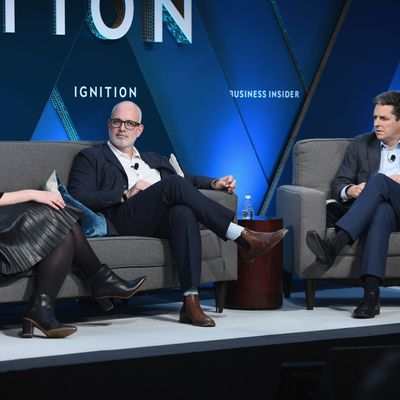
Last Monday, staff at two dozen subsidiaries of the Hearst Magazines media conglomerate announced their intention to unionize with the Writers Guild of America, East. Days later, workers formally asked the media company to recognize the union. But Hearst employees tell New York that company management does not appear likely to voluntarily recognize the union, and has instead taken an adversarial approach. According to interviews and a recording of an internal meeting, Hearst has warned workers that it believes that supervisors may have violated the National Labor Relations Act if they’ve signed union cards. Company executives have also urged some employees to withdraw their cards, and have characterized the union as a threat to Hearst’s company culture and values.
Staff members are feeling the pressure. “They told me, verbatim, that if I didn’t trust them, I didn’t have to work there,” said a Hearst employee who spoke to New York on condition of anonymity. She added, “They’re playing really, really nasty in a way that is very upsetting to a lot of people because we work very, very hard for the company.” Hearst is one of the largest and most influential media companies in the U.S., with a portfolio that includes Cosmopolitan, Elle, and Esquire. Though Hearst is relatively stable, it isn’t immune to the upheaval that afflicts the industry at large. The 500-employee magazine division suffered a round of layoffs last year, and a proposal to relocate Car & Driver from Ann Arbor, Michigan, to Detroit has been unpopular with the magazine’s staff, according to an editor who spoke to New York.
It’s not unusual for employers to express displeasure at the creation of a new union. Even progressive nonprofits, like the National Center for Transgender Equality and the Southern Poverty Law Center, often refuse to recognize their unions in a swift and amicable manner. In the media industry, company responses to unionization tend to vary. Some outlets voluntarily recognize new staff unions within a few days or weeks. Others are more reluctant to act: BuzzFeed waited months to recognize its union. But even by the uneven standards set by other media companies, Hearst has adopted an especially hostile posture toward staff.
Sources say that Hearst’s chief content officer, Kate Lewis, and Troy Young, the president of Hearst Magazines, have taken a hard line against the union in meetings with each brand and with staff members it has labelled supervisors. Annie White, a staff editor for Car & Driver, told New York that while her magazine’s meeting with Lewis, Young, and other members of management was not combative, Hearst representatives were “patronizing, a little paternalistic.”
“I think Troy [Young] literally said the words ‘we’re not union busting,’ and then came forward with all these classic union-busting talking points,” White added. The union was a third party, an outside force, they reportedly said, and they warned staff that Hearst may not be able to hand out raises outside a union contract. In White’s words, Young also described Hearst as a company with a “long-standing culture” which “is not for everyone, and if you don’t want to be part of this culture, that’s a decision that you have to make.” White said she did not interpret the remark as a threat, but as “an invitation to quit.”
Much of the conflict at Hearst centers on the size of the union’s proposed bargaining unit. Employers can shrink a bargaining unit by defining employees as supervisors, or members of management who are ineligible to unionize. But in practice, the delineation between supervisor and worker can be vague, especially in media companies. An editor can have direct reports, for example, but if they don’t have sole hiring and firing power over writers and assistants, the union can, and usually does, argue that they should be in the unit. (This is the case at New York, and at many other unionized media outlets.) Employers, meanwhile, prefer to define supervisory positions as broadly as possible, which keeps unions small.
That preference was on display in a Thursday meeting Hearst convened for workers it is trying to categorize as supervisors. In the meeting, according to an audio recording leaked to New York, Lewis and Young were joined by Hearst’s labor and employment attorney Adam Colon and Mark Theodore, from the Proskauer Rose law firm. “As many of you know, we made many, many changes over the past year and there’s a lot more to do,” Young said. “But we don’t think we need a union to evolve.”
Theodore’s presence at the meeting is revealing. In the recording he can be heard telling Hearst staff that he doesn’t approach his work from an “ideological standpoint.” But he’s an experienced management-side attorney for a law firm with a record of working with employers to weaken unions, though Hearst representatives presented him in a far friendlier light. “Mark’s a jokester, be warned,” Lewis cracked as she introduced him. But as the meeting proceeded, Theodore made statements that were clearly hostile to unions. “I have seen people go on strike for what would be characterized as the dumbest reasons ever,” he said at one point.
Theodore and Colon also repeatedly told staff that everyone who had been invited to the meeting was a supervisor as determined by federal law, that they therefore could not sign a union card, and that Hearst would violate the law if it allowed any of them to join the union. On the recording, Hearst employees can be heard questioning Theodore and Colon’s characterization of federal labor law. One woman, for example, notes that her professional counterparts at Vox Media belong to that company’s bargaining unit. Colon, in response, repeatedly tells her that Hearst “is going to follow the law.” Asked by another staff member if he is trying to say that Vox had broken the law, Colon answered, “Potentially.”
Rebecca Givan, a professor of labor studies and employment relations at Rutgers University, told New York that it’s not unusual for unions and employers to argue over the definition of a bargaining unit. “Management will try to define pro-union employees out of the bargaining unit, and often anti-union employees into the bargaining unit to tip the vote,” she said. “But any worker who seeks to be represented and is subsequently defined out of the unit hasn’t done anything wrong.”
Hearst representatives also encouraged staff at the supervisors’ meeting to revoke their union cards if they’d signed any. “This is not a witch hunt,” Lewis said. “In the long run, what it means is that if it comes to a vote, you cannot vote, right? Because you’re not in that class.”
“In the near run, the reason it advantages those who don’t want a union is because they’re looking for a certain number of cards within and they’re not really measuring whether you’re a supervisor or not at that point because they’re looking for scale,” she added. “The benefit of revoking, if you don’t want a union to come to Hearst, is that it will lessen the numbers.”
Staff members who support the union say they’re dismayed, though not necessarily surprised, by the strength of Hearst’s reaction. “I don’t think anyone thought that it would be simple,” said Sarah Rense, an editor at Esquire. “But it is disappointing to have this really strong majority of people advocating together to be a part of the decision-making process, and to be able to come and work together on a contract, and not be recognized for that.”
A source at Cosmopolitan, who spoke to New York anonymously for fear of reprisal, said that Young and Lewis had the magazine’s staff meet with them on Hearst’s corporate floor, which most workers had never even visited, and which is an intimidating environment for them. The meeting itself became heated, the source added. Though he and Lewis reportedly told staff that they didn’t intend to bash the union, Young repeatedly interrupted staff who tried to speak at the meeting, and so did Lewis. “A lot of the women who spoke up were crying,” the source said, and added, “It very much felt like a war. Even though the union is positive, and we weren’t coming to fight at all. We were just trying to have a good conversation.”
In a statement to New York, the Hearst union said its members are “excited” to get to the bargaining table and added, “It is both unfortunate and counterproductive that executives have chosen not to respect our informed decision and wage a campaign to thwart this. It will not work. We hope they’ll approach this in the way that has become standard in media, which is to respect employee rights to unionize.”
Members of Hearst’s public-relations department did not respond to requests for comment by press time.






























